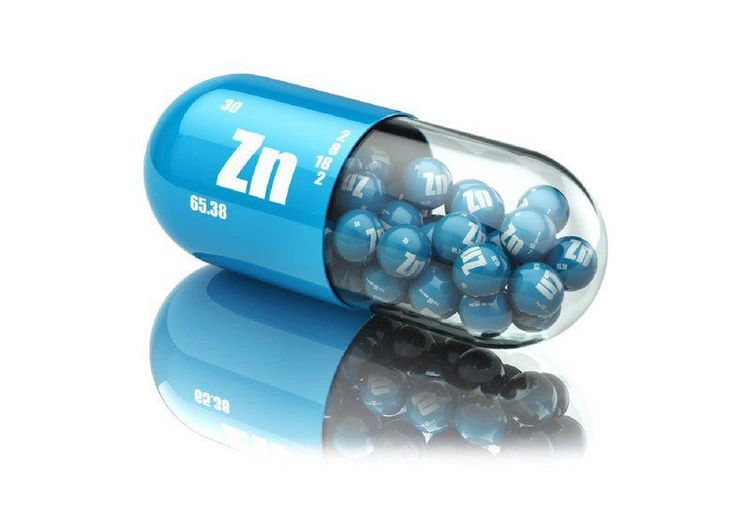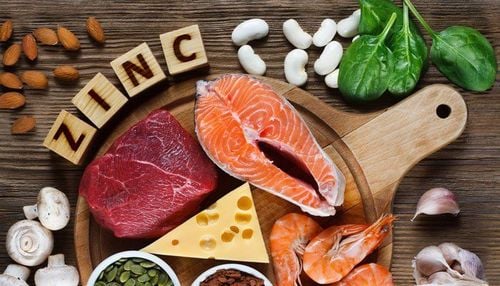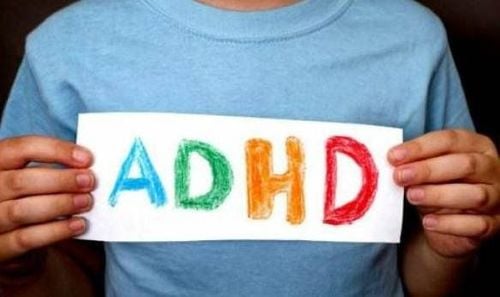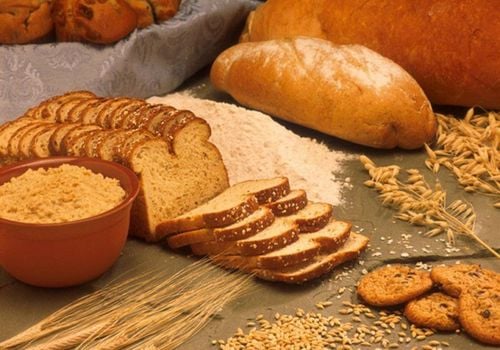This is an automatically translated article.
Zinc is a mineral found in many foods such as red meat, wholegrain breads and cereals, dried beans, seafood, and in small amounts in breast milk. Zinc is important for the normal growth and development of the reproductive organs and brain, and plays a role in the normal functioning of the immune system and many other body processes.Recently, zinc deficiency has been associated with decreased growth, increased colds and infections, memory impairment, learning disabilities and poor attention. Shortage is a big problem in developing countries.
1. Importance of Zinc
Zinc is a trace mineral that stimulates the activity of more than 70 enzymes in the digestive and metabolic processes in the body. Children with zinc deficiency will experience growth defects and abnormalities, poor immunity, and affected brain function; This makes zinc an important nutrient in any diet. In addition, zinc is also necessary for the growth and development of the reproductive organs in children.Zinc has a high concentration in the brain in the hippocampus, cerebral cortex, fascia... a lack of zinc will lead to peripheral nerve disorders, cause schizophrenia, regulate neurotransmitters, support support cognitive development, zinc deficiency will lead to behavior disorders Helps transport calcium to the brain , enhance learning ability Regulate hormonal functions such as pituitary, gonads, thyroid, adrenal glands combined with neuroendocrine regulation to regulate internal living activities, flexible response to external influences In addition to helping the body adapt to the situation, so lack of zinc, people are poorly adapted to the changes. Helps the body to self-treat the common cold and diarrhea in children Zinc distributes to the skin, hair and nails to help them grow normally, zinc deficiency causes hair to become stiff, hair color turns yellow, nails are brittle, and slow to grow. , dry, dark skin, white spots on the skin Zinc deficiency makes the sensitivity of taste completely lost or less sensitive, causing anorexia, loss of appetite, and can cause a number of diseases such as mucositis Oral mucosa ... Helps synthesize and secrete growth hormone to enhance immunity, fight infections Promote healthy height and weight Helps body produce protein and DNA Heals wounds and prevents degeneration Age-related macular degeneration Prevents retinal damage and vision loss Topical zinc ointment is applied to the skin of children to treat diaper rash and prevent sunburn. Zinc acts as a powerful antioxidant that helps reduce your child's chances of developing cancers.

Kẽm có vai trò quan trọng đối với cơ thể con người
2. Manifestations of zinc deficiency in children
Children with zinc deficiency have symptoms such as anorexia, growth retardation, unexplained vomiting, sleepless nights, sleepless nights... Children with delayed physical development, reduced memory, increased risk of disease diarrhea, acute respiratory infections ... Children encounter skin and mucosal lesions, slow wound healing, hair loss, hair loss... Children are prone to allergies, often have problems with their health. skin such as dry skin, eczema, psoriasis, acne, nail dermatitis... Children have white spots on the soles of their fingernails, nails with stripes, brittle, brittle nails, long nails. Late puberty. Consult your doctor when your child shows these signs.
3. How much zinc does your child need?
Zinc is necessary for the functioning and growth of the body but should only be tolerated in the body according to the recommended dosage as follows:
0–6 months - 2mg 7 months to 3 years old - 3mg 4–8 years old - 5mg 9–13 years old - 8mg 14-18 years old - 11mg Girls aged 14-18 need only 9mg per day Teens are not advised to consume more than 34 milligrams of zinc per day. Too much zinc in the body exposes children to various harmful side effects.
4. Good source of zinc

Kẽm có trong một số loại thực phẩm từ thiên nhiên
Our body cannot produce zinc on its own, so it is necessary to supplement zinc from natural food sources in the daily diet. Here are some zinc-rich foods for kids:
Nuts: Most nuts are a great source of zinc, making a great addition to a child's diet because they contain fiber and fat. Good, essential vitamins and minerals. In which seeds such as sesame seeds, hemp, mustard, pumpkin and chia seeds contain a rich amount of zinc. Whole grains: Whole grains (wheat, oats, rice) are still popular because they provide other important nutrients like fiber, B vitamins, magnesium, iron, phosphorus, manganese, and selenium. . But it is impossible not to mention that cereals also contain a nutritional mineral called phytate, which reduces the body's absorption of zinc. Meat: All meats are rich in zinc. Eat poultry without skin or lean meat to get the required amount of zinc. Low-fat milk and yogurt: We always think dairy products have a lot of calcium. But forget that most dairy products like low-fat milk and yogurt also contain a significant amount of zinc. Give your child low-fat milk and yogurt to supplement the necessary trace elements. Each cup of yogurt contains 2.2 mg of zinc. Legumes: All legumes contain a good amount of zinc. However, the absorption of zinc is less in legumes, because of the presence of antinutrients - phytates. You can include legumes in your family's meals to provide important fiber and protein. If your child shows signs of zinc deficiency, give them boiled chickpeas as a snack. Seafood: Oysters are the best choice to meet your zinc needs, an average oyster contains about 5.3 mg of zinc. However, not many children can eat oysters, but don't worry because the zinc content in lobsters and crabs is no less. The amount of zinc in foods varies, so depending on the needs and taste of the child, you choose the food and balance the nutrition for the child.
5. Could your child be getting too much zinc?
Sometimes you worry about whether your child is getting enough zinc through food and decide to give them more zinc supplements, advice for you is not to do it without consulting doctor's opinion. Zinc supplements have potential side effects that you could not foresee if taken in the wrong dose.
Always provide the prescribed dose and do not give your child an overdose of zinc because an overdose can also lead to various health complications such as:
Possible side effects such as vomiting, nausea, diarrhea diarrhea and abdominal pain. High doses of zinc in children have been associated with increased blood cholesterol levels and recurrent infections. May interact with other medications such as immunosuppressants, blood pressure medications, and antibiotics. Children under 18 years of age are not recommended to take over-the-counter zinc supplements unless directed by a doctor. Do not give zinc nasally if you choose to give your child a zinc supplement because it has been linked to a loss of smell. Long-term use of zinc supplements can lead to toxicity. In addition to zinc, children also need to be supplemented with lysine micronutrients, essential micro-minerals and vitamins such as zinc, chromium, selenium, and B vitamins to help meet their nutritional needs, aid digestion, and enhance their ability to function. ability to absorb nutrients, help improve anorexia, help children eat well.
According to the recommendations of the Food and Nutrition Board of the American Institute of Medicine: The maximum level in a day that the body can accept with zinc supplements is 7mg for ages 1-3 and 12mg for children from 4 to 8 years old.
For more nutritional knowledge and child care for each age, parents should regularly visit the website vimec.com and make an appointment with the leading doctors, pediatric and nutrition experts of the National General Hospital. Vinmec when needing advice on children's health.
Articles refer to sources: babycenter.com, parentcircle.com, parenting.firstcry.com













